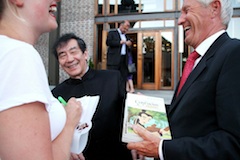Touching gift from senior Confucian scholar to head of Council of Europe
July 27 2013:
 |
 |
 |
Professor Tu and Thorbjorn Jagland |
Last night, in a strong signal of cooperation between the two cultures, China’s most senior scholar of Confucianism, Professor Tu Weiming gave to the secretary-general of Council of Europe, and former prime minister of Norway, Thorbjorn Jagland, copies of the work of China’s most ancient philosopher, Confucius.
The presentation, in the Archbishop’s palace beside Trondheim Cathedral, happened on the first day of an historic meeting in Trondheim of the international Green Pilgrimage Network, in which Confucianism announced its first ever statement on the environment.
“It is touching to get this from this important man, with such a great influence in China,” Mr Jagland said. “I think China is being built on some really important values right now. What is good is that this [change] is coming from inside China; it is not something that is brought to the country from the outside.
“It is very positive that there are so many delegates here from China. We have a good cooperation in so many ways. I think this [connection] is important for the relationship between Norway and China, and that it can help us solve some of our political challenges.”
He said that what is important to China, is also important to Norway.
The Confucianists coming to Norway to announce a new conservation alliance, and this conference now, symbolise two things, said Professor Tu, who is also the President of the International Confucianist Ecological Alliance.
“Two things are happening now: first China is reclaiming its cultural heritage through looking back at old wisdom. And secondly it is beginning to make the link between religion and science. There is a real movement in China to reunite important values: of heaven, earth, nature, family and of teaching.”
“This isn't only appreciating the historical and cultural heritage of China; it is important wisdom for the whole world to learn. The reason I am giving this gift to Thorbjørn, is that I would like to share this knowledge with the best people from Europe.”
ICEA also this morning gave scrolls (in which the same words for good fortune were written in the very different calligraphies of each of five Qing emperors) to the National Pilgrim Centre, Trondheim, and to the municipality.
There are 11 representatives from China at the meeting, both from the Confucianist tradition and also representing the Daoist religion, which has played an active role on environment action for the past 10 years, based on 2,600 years of environmental teaching.
The GPN is a global network of pilgrim cities and sacred sites around the world wanting to be models of green action and care. It works in partnership with the faiths and the secular organizations all around the world, in the area of what is the largest single collective human activity in the world: pilgrimage. The aim is to explore and demonstrate how to make the cities and places of today into the best possible cities and places of tomorrow, using as models some of the world’s holiest (and therefore best-loved) places.
Some 200 million people go on pilgrimage every year. This year, 2013, it is perhaps 250 million, as it is the one year in twelve that the Hindu Kumbh Mela pilgrimage has taken place during January and February.
The GPN was launched in 2011 at Assisi in the presence of Princess Michael of Kent. This is its second international meeting. Already many of the members have introduced extraordinary environmental actions.
LINKS
The Economist article
Trondheim meeting, with delegate bios and timetable
ARC Flickr account for photos article
Read a report on the outcome of the Trondheim Green Pilgrimage Network meeting here.
Green Pilgrimage Networkarticle
|

